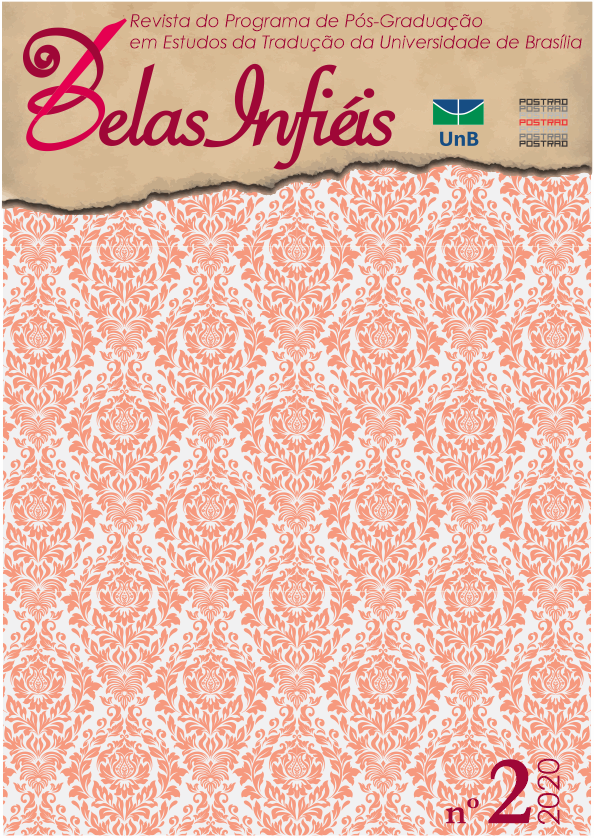A new translation of Ovid’s Amores 1.8
DOI:
https://doi.org/10.26512/belasinfieis.v9.n2.2020.27209Keywords:
Poetic translation. Experiments with meter. Elegiac couplet. Emulation of ancient rhythms. Latin elegy.Abstract
This translation is part of a first review of a work presented in my Master’s thesis (SOUZA, 2016). The proposal was to translate Ovid’s elegiac couplets in a form that could echo the original rhythm of the Latin poem. To to that, I used Carlos Alberto Nunes’ metrical choices as a reference, the substitution of long syllables in princeps position for stressed syllables in Portuguese. However, in my translation, different from Nunes, I admitted an stressed syllable to be followed by only one unstressed, compounding a trochee, which can be performatively executed as spondee. In this way, the possibility of variation was maintained in the meter, but the dactiles remained fixed as such in the hexameter’s fifth foot and in the pentameter’s second hemistich. The mandatory caesura in the pentameter was executed by having two stressed syllables side by side, and emphasized by a mandatory graphic space, in order to compel the reader to restart the rhythm. To maintain the pace of the meter, I employed resources as artificially displacing the stress to the beginning of a word, elision between a vowel-end of an hexameter and a vowel-beginning of the pentameter, and elisions in general. This revised version shows improvements in the hexameters, which now are preferentially executed with their caesuras, even with feminine caesuras as result. In addition, the tone of the poem is lighter and more fluid, with the elimination of radical hyperbata and the reorganization of content within the elegiac couplet, which is the unity in the poem.
Downloads
References
HOMERO; NUNES, C. A. (trad.) Ilíada. Rio de Janeiro: Ediouro, 1989.
HOMERO; NUNES, C. A. (trad.) Odisseia. Rio de Janeiro: Ediouro, 2002.
McKEOWN, J. C. Ovid: Amores. Text, prolegomena and commentary in four volumes. v.2. Great Britain: Francis Cairns (Publications), 1989.
OVÃDIO; KENNEY, E. J. (ed.) Amores, Medicamina Faciei Femineae, Ars Amatoria, Remedia Amoris. 2nd. ed. Oxford: Oxford University Press, 1994.
OVÃDIO; SHOWERMAN, G. (ed.) Heroides: Amores. 2nd. ed. Cambridge, Mass.; London: Harvard University Press, 1977.
SOUZA, L. dos S. Bi-tradução do livro primeiro dos Amores de Ovídio: reflexões sobre dois modos de verter o dístico elegíaco. Dissertação (Mestrado em Letras) ”“ Setor de Ciências Humanas, Universidade Federal do Paraná. Curitiba, 2016.
VIRGÃLIO; NUNES, C. A. (trad.); OLIVA NETO, J. A. (org.) Eneida. São Paulo: Ed. 34, 2014.
WEST, M. Studies in Greek Elegy and Iambus. Berlin: De Gruyter, 1974.
WEST, M. Greek Metre. New York: Oxford, 1996.
Downloads
Published
How to Cite
Issue
Section
License
Given the public access to this journal, the texts are free to use but requires the recognition of the original authorship and initial publication in this journal to be properly stated.
 The journal allows the use of works published for non-commercial purposes, including the right to submit the work to publicly accessible databases. Published contributions are the sole and exclusive responsibility of the author(s).Â



















